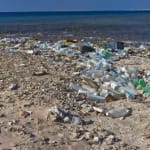 Marine Litter continues to dominate the media, now the European Commission is responding to the discussion. To tackle the plastic waste in the oceans and seas, the Commission proposes new regulations for the reduction of plastic waste. The focus is on the ten single-use plastic products most often found on Europe's beaches and seas, as well as lost and abandoned fishing gear.
Marine Litter continues to dominate the media, now the European Commission is responding to the discussion. To tackle the plastic waste in the oceans and seas, the Commission proposes new regulations for the reduction of plastic waste. The focus is on the ten single-use plastic products most often found on Europe's beaches and seas, as well as lost and abandoned fishing gear.Different measures will be applied to different products. Where alternatives are readily available and affordable, single-use plastic products will be banned from the market. For products without straight-forward alternatives, the focus is on limiting their use through a national reduction in consumption; design and labelling requirements and waste management/clean-up obligations for producers.
A Bundle of Measures
Concretely, the new rules will introduce:- Plastic ban in certain products: The ban will apply to plastic cotton buds, cutlery, plates, straws, drink stirrers and sticks for balloons which will all have to be made exclusively from more sustainable materials instead. Single-use drinks containers made with plastic will only be allowed on the market if their caps and lids remain attached;
- Consumption reduction targets: Member States will have to reduce the use of plastic food containers and drinks cups. They can do so by setting national reduction targets, making alternative products available at the point of sale, or ensuring that single-use plastic products cannot be provided free of charge;
- Obligations for producers: Producers will help cover the costs of waste management and clean-up, as well as awareness raising measures for food containers, packets and wrappers (such as for crisps and sweets), drinks containers and cups, tobacco products with filters (such as cigarette butts), wet wipes, balloons, and lightweight plastic bags. The industry will also be given incentives to develop less polluting alternatives for these products;
- Collection targets: Member States will be obliged to collect 90% of single-use plastic drinks bottles by 2025, for example through deposit refund schemes;
- Labelling Requirements: Certain products will require a clear and standardised labelling which indicates how waste should be disposed, the negative environmental impact of the product, and the presence of plastics in the products. This will apply to sanitary towels, wet wipes and balloons;
- Awareness-raising measures: Member States will be obliged to raise consumers' awareness about the negative impact of littering of single-use plastics and fishing gear as well as about the available re-use systems and waste management options for all these products.


